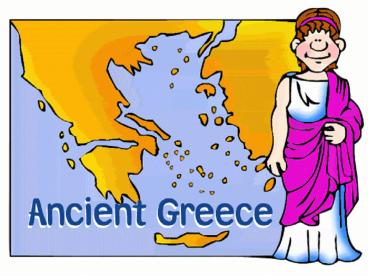Ancient Greece - PowerPoint PPT Presentation
1 / 34
Title:
Ancient Greece
Description:
Recall (You May Use Your Notes) What are 3 aspects from the Ancient Greece presentation that interest you the most? Aspect 1: Aspect 2: Aspect 3: Minoan Civilization ... – PowerPoint PPT presentation
Number of Views:158
Avg rating:3.0/5.0
Title: Ancient Greece
1
2
Early People of the Aegean
- Minoan Civilization
- Migrated from the Island of Crete
- Named them after Minos, legendary king of Crete
- Success through sea trade
- Rulers lived in the palace at Knossos
- Disappeared by 1400 BC
- Volcanic eruption
- Earthquake
- Tidal Wave (Tsunami)
- Invaders (Mycenaean)
3
Art of the Minoans
4
Rulers of Mycenae
- First record of Greek-speaking people
- 1400 BC to 1200 BC
- Sea traders
- Warrior-king built a thick-walled fortress
- Ruled surrounding villages
- Lots of treasure, especially gold ornaments
5
Art of the Mycenaean
6
Trojan War
- Around 1250 BC
- Economic rivalry between Mycenaean and Troy (a
city now in Turkey) - Troy controlled the Dardanelles Strait (narrow
water passages) that connect the Black Sea and
Mediterranean sea.
7
(No Transcript)
8
(No Transcript)
9
(No Transcript)
10
Who Is This Person?
11
The Age of Homer
- Homer
- Lived around 750 BC
- Blind poet
- Wrote the Iliad and the Odyssey, two famous
historical epic poems - Iliad is a major source for the Trojan War
- Odyssey describes how Odysseus returned home to
his faithful wife, Penelope, after the fall of
Troy - Both provide insight to the values of ancient
Greeks such as honor, courage, and eloquence
12
The Real Homer
13
The Rise of Greek City-States
The Rise of Greek City-States
- Small city-states developed (30,000 - 100,000)
- Sailors traded
- olive oil
- wine
- marble
- metals
- By 750 BC, rapid population growth forced many
Greeks to uproot, bringing their ideas and
culture with them
14
The Polis
- Unique version of the city-state, developed after
750 BC - Built usually on a hilltop (acropolis)
- Temples dedicated to gods and goddesses
- Included homes, theater, and an agora
(marketplace)
15
(No Transcript)
16
(No Transcript)
17
Early Governments
- 750-500 BC, different forms of government
evolved - Monarchy
- Ruled by King or Queen
- Aristocracy
- Ruled by wealthy landowners
- Oligarchy
- Rule by middle-class farmers, merchants, and
artisans
18
Example of a Phalanx
19
American Football is based on the phalanx
formation
20
Changes in Warfare
- Military technology increased power of the middle
class - Iron weapons and tools replaced bronze
- Made helmets, shields, and swords
- Phalanx
- Heavily armed soldiers in rows
21
Sparta A Nation of Soldiers
- Were part of the Dorians culture
- Great soldiers
- Conquered people into slaves called helots
- Brutal system of strict controlexecutions
- Government 2 kings and a council of elders
- Citizens approved all major decisions
- Citizens were male, native-born Spartans over the
age of 30 - Assembly elected 5 ephors or officials who held
the real power and ran day-to-day affairs.
22
Where Is Sparta?
23
- From birth, Spartans were part of a military
state - Healthy babies lived sick or weak babies were
left to die - At 7, boys were sent to the barracks (military
training) - At 20, they could marry, but had to live in the
barracks - At 30, they took their place in the assembly
- Spartans isolated themselves from other Greeks
and forbade their citizens to travel
24
Athens A Limited Democracy
- Government evolved from a monarchy to an
aristocracy - Ordinary people were discontent (dissatisfied)
- Athens moved toward democracy (government by the
people) - Only male citizens could participate in
government
25
Where Is Athens?
26
(No Transcript)
27
Women
- Sparta Women
- Trained to produce healthy sons for the army or
else - Obey fathers and husbands
- Could inherit property
- Men were occupied with war, so some women were in
charge of entire estates
- Athens Women
- No share in public life
- Guided by men
- Lived in seclusion (lonely)
- Managed the entire household
- Spun, wove, cared for their children, and
prepared food.
28
Forces of Unity
- Shared a common Greek culture
- Same language
- Greek
- Same gods
- Polytheistic (belief in many gods) Zeus was the
most powerful - Same heroes
- Hercules Jason and the Argonauts Perseus
Odysseus - Same festivals
- Olympic games
29
(No Transcript)
30
Victory in the Greek World
- The Persian Wars (Athenians vs. Persians)
- Greeks rebelled against Persian rule in 499 B.C.
- Pe rsian emperor, Darius, sent a huge force to
attack - Force landed in Marathon 490 BC
- Greeks sent Pheidippides to carry news to Athens
he sprinted 26.2 miles and died. Marathons today
are 26.2 miles. - Greeks defeated Persians
- Athens emerged as the most powerful city-state in
Greece
31
Golden Age of Athens
- Pericles
- A noble statesman
- Economy thrived
- Government became democratic
- 460 BC to 429 BC is often called the Age of
Pericles - Rebuilt the Acropolis
- Athens became the cultural center of Greece
- Paid salaries and enabled poor men to serve
32
(No Transcript)
33
Peloponnesian War
- 431-404 B.C. Athens vs. Sparta
- Athens attacked by sea
- Sparta attacked by land
- Plague broke out, killing 1/3 of the population,
including Pericles - 404 B.C. with help from the Persians, Sparta
captured Athens - Democratic government suffered
- Corruption and selfish interests ran rampant
34
Recall (You May Use Your Notes)
- What are 3 aspects from the Ancient Greece
presentation that interest you the most? - Aspect 1
- Aspect 2
- Aspect 3






























![[PDF READ] Free Ancient Greece (A True Book: Ancient Civiliz PowerPoint PPT Presentation](https://s3.amazonaws.com/images.powershow.com/10117975.th0.jpg?_=202409020711)
